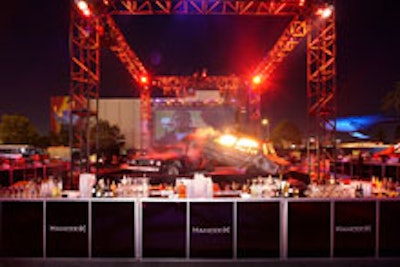
“Hollywood is recession proof.” That old, familiar sentiment dates back to the Great Depression, when the unemployment rate was greater than 25 percent, but the movie industry endured as people still seemed willing to spend what little they had on entertainment—also known as escapism. The popular theory is that the entertainment industry can survive any economic hiccup, including the current recession; so far this year, domestic box office numbers are up from 2008.
But how about the events that support and promote Hollywood’s movies and shows? They’re plodding along in the current economy, too—but more thoughtfully and less flamboyantly—according to their organizers and producers. “We are busy, but like with everybody else, it's really about corporate responsibility,” said Warner Brothers Studios special events director Hillary Harris, indicating that putting forth a targeted message and being mindful of perception are the keys these days. “What it boils down to is putting your money where the focus of your project is. The message is the most important thing. If you do that, you'll not only be successful, but you'll be politically correct.”
There isn’t necessarily a direct connection between movies’ success at the box office and the budgets of related events. Los Angeles County Economic Development Corporation senior vice president and chief economist Jack Kyser said that the feature film business is in good shape, with domestic box office receipts up over last year by about 14 percent. On the TV side, the broadcast network business is struggling because advertising revenues have declined sharply, but cable networks are holding steady. “What you have is that most of the studios are parts of media conglomerates, and those are feeling pressure on profits and are looking for divisions to make cutbacks,” Kyser said. “You get a sense that there has been some dialing back on these events. When a movie is getting its first screening, people turn out for it, but [the parties] don't have quite the bells and whistles that they used to have.”
Fox Searchlight Pictures vice president of national promotions and special events Ruth Busenkell pointed out that the studio’s budgets have always been fairly modest. “We see it in the box office that the movies are doing well, but all the studios are still being careful. Some films [at each studio] are doing better than others and it all has to come out in the wash.”
Busenkell said that the approach is slow and steady. “Everybody's going one step at a time. It's more about evaluating right now: Should we really be doing this, or should we be conservative? We're still talking about premieres for our upcoming movies—we're not not doing them, but maybe thinking about them and making them a little bit smaller than we might have otherwise. Looking at what my budgets are down the road, they're not really different than what they have been. As we're approaching each film, we do look and ask if we need to reconsider how much we're spending, but it hasn't changed drastically for us.”
Perception is also an important issue for the studios—as it is for all corporations in the era of taxpayer-funded bonuses. “Bank of America did some big promotion for some film, and the media was criticizing them for putting money into marketing something other than their [core banking business]. People are really conscientious about perception,” said Fox Searchlight’s Busenkell, who pointed out that although her studio has had some big hits lately with Slumdog Millionaire and Juno before it, the events she plans for the movies happen before they are known successes—and therefore before they are known to be slam-dunk investments. “For Slumdog, we did a really small event on a very modest budget—a screening at the Landmark with a nice reception after, but it was modest. And then the movie was hugely successful. For us, we never know [how much the movie will make until after our event work is done].”
Mary Pat Kasravi, senior production manager at ELS, which handles many of the red-carpet arrivals and premiere events for Hollywood pictures, said, “It's up to the event coordinators to make things look really good without having to just go outrageously crazy. They don't want to look like they're going over the top and spending outrageous amounts of money, but [at the same time] you don't want it to look like a down-and-dirty event, even if it is.” Kasravi said she's observed many studios dipping into their theatrical prop houses more than usual to make a splashy impact at premiere parties instead of spending more than necessary on decor.
“This is a sensitive issue. Corporations don't want to be viewed as spending money in a way that could be perceived as lavish or irrational—it's the A.I.G. effect writ large,” Kyser said. Studios are concerned that the perception issue is tough to control, no matter what approach a company uses to address the matter. HBO—which staged events in Los Angeles, New York, and East Hampton last week for its new take on the documentary Grey Gardens—declined to comment for this story.
Although Hollywood events may not be totally recession-proof, the atmosphere is one of prudent, tactful business as usual. “The mood is more hopeful than it is grim across Hollywood,” said ELS’s Kasravi. “Everyone is being realistic right now in terms of what they can do—but I don't see it as being grim. They still want to have these events.”
As for the economic impact on Los Angeles, Kyser added, “It's the old idea that people are looking for entertainment, even though times are bad. And going to the movies is still a fairly inexpensive way to entertain them. And then you look at the [events surrounding the industry, such as the] Academy Awards and that brings in serious money, around $137 million over all—hotels, limo services, venues booked for private parties—this means a lot of money. And that means jobs for a lot of people.”



















